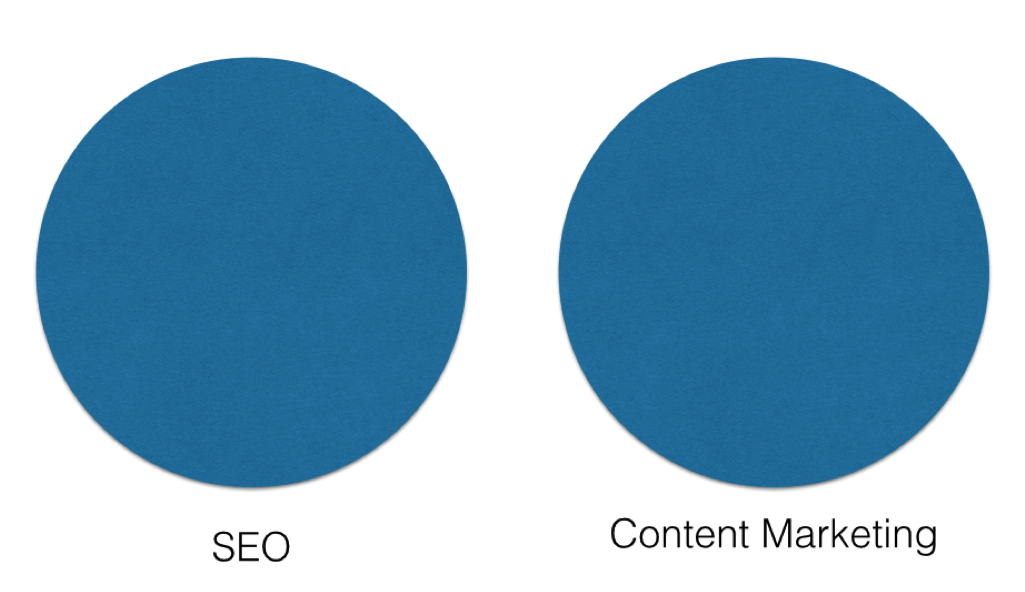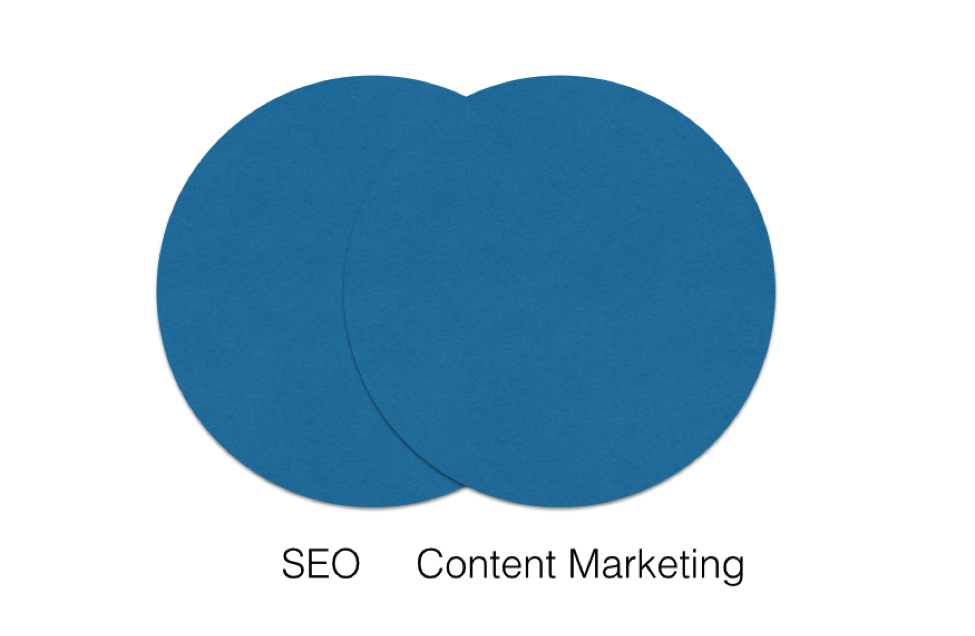Why SEO Is Actually All About Content Marketing
There’s a bit of confusion over SEO and content marketing. The confusion comes over how SEO and content marketing fit together. Do they fit together? Are they at odds with each other? If so, is it possible to force them together?
In a previous post, I explained why SEO and content marketing are like PB&J. They go together. They just fit. They work well together.
Now, I want to share exactly why that is — why SEO is actually all about content marketing, and vice versa.
Before I share the why of this article, let me be clear about the what — the problem I’m addressing.
The Problem: SEO and content marketing are not integrated.
The crux of the problem is that SEO and content marketing are separated, as if they were two very different things. The truth is, however, that they go together, overlap, cohere, blend.
Some people think that content marketing eliminates the need for SEO.
Look at these headlines:
This makes no sense to me.
How can “content marketing overtake SEO completely” when the only way to successful content marketing is to have SEO? How can you tear the two apart like that?
Thankfully, there are voices of reason in the cacophony of confusion (e.g., the smallbusiness.yahoo article above). Careful marketers have observed the disconnect, and are trying to point out that SEO and content marketing go together.
Yet the mistake persists. One of the popular articles that makes this mistake comes from an article in The Guardian, which states: “It looks like Google has tired of its old friend SEO and is instead cosying-up to the new kid on the block, content marketing” [sic].
It’s a cute analogy, but it’s simply not accurate. It’s not as if SEO and content marketing are two different people. To borrow the same metaphor, SEO and content marketing are actually two personalities of the same person.
The problem, then, lies in the disconnect between SEO and content marketing.
It’s time to bring the two back together. This is the only way you’ll be successful in both your SEO and your content marketing.
The Truth: SEO and content marketing overlap. A lot.
When trying to understand the integration of SEO and content marketing, think of it this way.
First, here’s the incorrect view of SEO and content marketing. This is wrong:
Now, here’s the right way to view them:
They overlap.
There are differences between SEO and content marketing.
Yes, SEO and content marketing are distinguished from one another in several critical areas. And while they have points of differentiation, you still can’t separate the two entirely.
Rather than chase down every point of difference between the two, I want to point out this elemental contrast:
- SEO is narrower, and more technical.
- Content marketing is broader and more holistic.
This is the way in which the two converge:
- The way to apply SEO in a broader way is to channel its specific technical endeavors into content marketing.
- Conversely, the only way to ensure the success of content marketing is to apply SEO techniques in its implementation.
How SEO and Content Marketing Come Together
Another way to look at it is like this — SEO makes demands. Content marketing fulfills those demands.
Think of it as a conversation between two people.
SEO states the requirements. Content marketing fulfills them.
Now, let me show you how exactly SEO and content complement each other.
In each of the points below, I state exactly what SEO requires, and how content marketing meets that requirement. Keep in mind that conversation between SEO and Content Marketing (above) as you review each of the following points.
SEO demands content. Content marketing is content.
There is no such thing as SEO without content. You need words, articles, substance, keywords, verbiage.
I wince whenever I have to say it, because it’s so cliche, but it’s true: Content is king.
We don’t argue about that anymore. It’s a truism of the SEO industry. Content content content.
And what is content marketing all about? It’s about content. The practical application of SEO (content) is the very substance of content marketing.
When SEO shouts, “We need more content!” content marketing responds, “Gotcha taken care of!”
SEO demands keywords. Content marketing means using keywords.
Here’s another feature of SEO: Keywords.
No one would argue that a fundamental component of SEO is keywords —researching them, utilizing them, and tracking your ranking of them in the SERPs.
How does one apply the use of keywords? How is all the research funneled into its practical application?
It’s called content marketing. The only way you can use your keywords is to be employing them strategically throughout your content. Content marketing consists of top-notch content, written for humans, and using the keywords that you’re targeting.
Obviously, Panda will nail you if you insist on stuffing your pages with keywords and over optimizing. But when SEO and content marketing do what they’re supposed to do — work in sweet harmony together — you’ll be fine.
SEO demands linkbacks. Content marketing introduces linkbacks.
SEOs dream about linkbacks — a huge, fat, DA 98 linking to your site. Or, an incredibly powerful .edu tossing a link to your blog article.
This SEO dream can only come true if you’re unleashing stellar content through content marketing.
You can build links by contracting with a link building agencies. Some are reputable,some not so much.
But the best way to build links is by publishing killer content, and letting the masses link back to it. This is the real way to continual SEO success.
If you want this important component of SEO, you’ve got to have the indispensable element of content marketing.
The only way to get a linkback — that dangling SEO carrot — is to have content worth linking to.
SEO demands onsite technical optimization. Content marketing needs great UX.
I anticipate that some SEOs may still object to my point, at least in part.
Here’s why. SEO is about more than just blog articles, keywords, and linkbacks. SEO is about optimizing the robots.txt, enhancing metadata, utilizing proper tags, and constructing a strategic sitemap. Technical stuff like that.
Yes, it is. And, yes, this is also tangentially related to content marketing.
This technical optimization is put in place for the good of the user — whether the user is searching, selecting, or reading your content. It’s accurate to think of these enhancements from a user experience (UX) perspective. These technical SEO components are present in order to serve the user and promote your content.
Again, the link between SEO and content is inextricable. Why do you want a good sitemap? So people can more easily find and access your content. Why do you want an optimized robots.txt? So search engines can better crawl your site, and so readers can see the content. Why do you want the right tags in the right places? So your content can get stellar indexing, accurate search results, and more readers of your content.
It all comes back to content.
SEO demands consistent output. Content marketing requires consistent.
Google likes fresh content, and they have for a long time. If you know SEO, you know that fresh content gets rapidly indexed, and registers higher in the SERPs than older low-value content. When this fresh content appears on a site with historic authority, you can be sure that it’s going to have a SERP boost.
Good SEO, then, means consistent output of content. Consistent output means that you’re doing content marketing, and you’re doing it right. There isn’t any way around it.
Content marketing is an active verb, with ongoing action. You don’t just do it, and then stop. You do it, and keep doing it. And on and on.
Content marketing and SEO converge again.
Conclusion
I could continue to discuss applications ad nauseam, but I hope the point is clear: SEO is actually all about content marketing. And content marketing is all about SEO.
Here are two takeaways that I want to leave you with:
1. You’re not an SEO, unless you’re also a content marketer. You’re not a content marketer, unless you’re also an SEO.
I’m not trying to be harsh or unkind, especially if you call yourself an “SEO” or a “Content Marketer” exclusively. That’s fine, and you can keep doing that.
The point I want to make is that your content marketing needs SEO, and your SEO needs content marketing. These are no longer disparate departments with disconnected efforts. An SEO needs to know about content marketing, and vice versa.
I’d love to see these two occupations blend a bit more. I don’t think that the acronym SEOCM (Search Engine Optimization + Content Marketer) is going to take off, but that’s how you can think of yourself.
2. Your SEO campaign will fail unless you integrate content marketing. Your content marketing campaign will fail unless you integrate SEO.
In a recent post, I explained why your content marketing is doomed to fizzle and die without several key features. Each of those features had to do with SEO.
Clearly, content marketing is only going to be successful if it has SEO features. Look at it this way: Your content is going nowhere unless people search and find. In order to make it found, you need SEO.
Bring these two together. Alone, they are impotent. Together, they are dynamite.
How do your SEO and content marketing efforts complement each other?
Article Source : https://blog.kissmetrics.com/seo-is-content-marketing/




Comments
Post a Comment